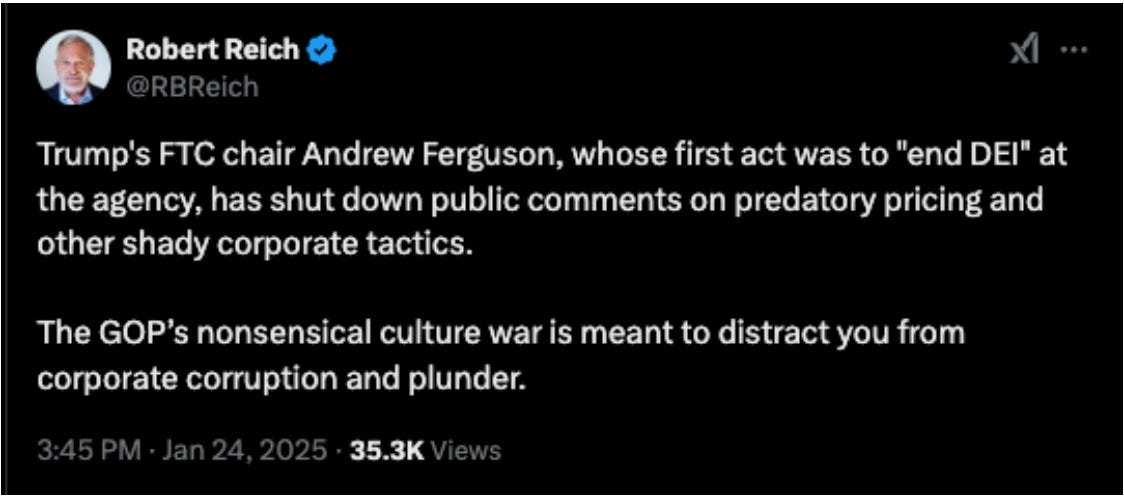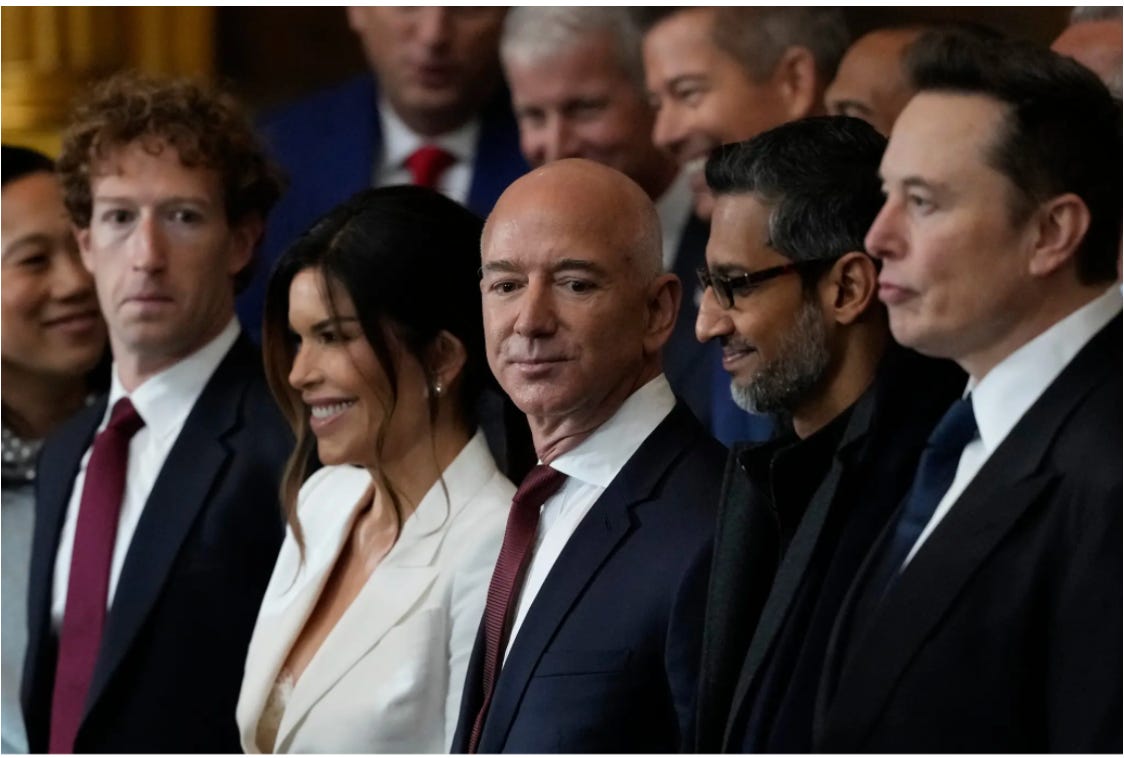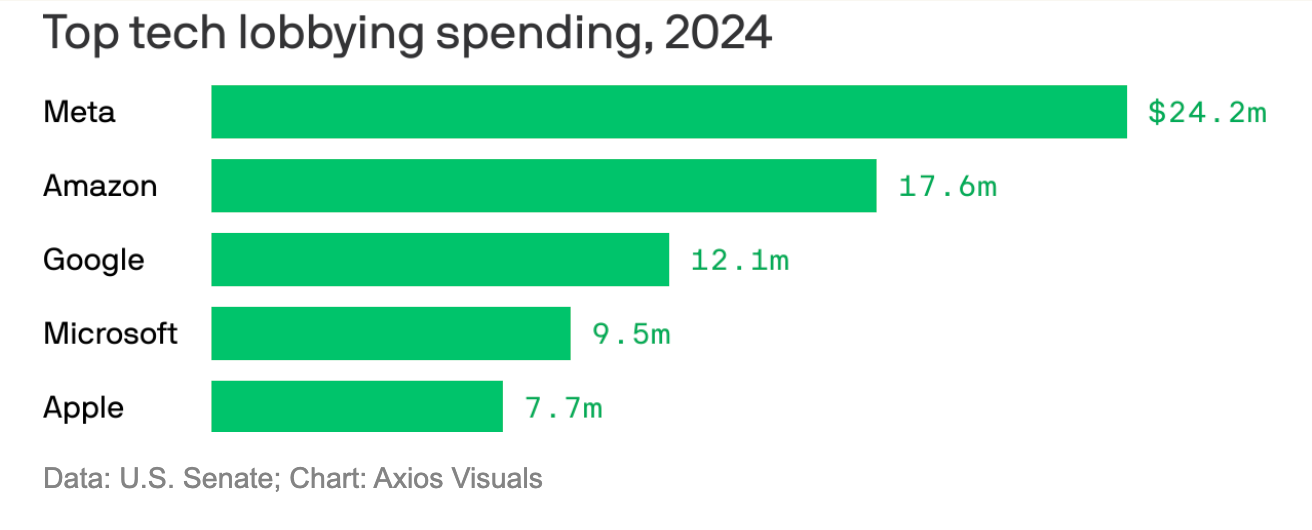Top Hat & Thimble - January 2025
Welcome to NextGen Competition’s newsletter, delivering insider insights on antitrust battles, industry shakeups, AI trends, and more.
Last February, NextGen Competition led a coalition letter supporting the Federal Trade Commission’s 6(b) inquiry into Big Tech’s growing influence over the rapidly evolving landscape of generative AI. We worried that the concentration of AI development within a small group of powerful corporations posed significant risks to consumer rights, data privacy, and the ethical development of AI.
Companies like Alphabet, Amazon, and Microsoft were attempting to monopolize AI startups like OpenAI and Anthropic through pseudo-mergers, talent poaching, and cloud partnerships. So on January 17, when the FTC finally issued its findings, we were ecstatic. The 11th-hour report released under Chair Khan’s leadership highlights critical concerns, including the role of concentrated control over essential computing resources—such as cloud infrastructure—and how this dominance impacts competition in the AI market.
It also calls attention to the risks posed by dominant firms’ exclusive access to these startups’ engineering talent and proprietary data, which create high barriers to entry for new competitors. Additionally, the report warns that these companies’ strategic partnerships with AI developers may distort innovation by prioritizing proprietary ecosystems over open, competitive markets. We commend Chair Khan and the FTC Staff for their work getting this report published before the new administration gives Big Tech the keys to the agency.
In recent months, the fealty shown by tech CEOs to President Trump—evident in their prominent seating in the “oligarchs only” section of the U.S. Capitol rotunda during the inaugural festivities—leads us to believe that the new administration is unlikely to scrutinize Big Tech’s practices.
But we will.
The FTC’s findings reinforce the urgency of our work and the importance of maintaining vigilance in holding these corporations accountable. We hope you’ll join us in the coming months as we continue to push for accountability and fair competition in this critical space.
Together, we can ensure the next four years are not defined by unchecked corporate dominance.
Sincerely,
George Rakis
Executive Director
NextGen Competition
Big Tech's Generative AI Takeover Playbook Explained
Looking for a quick refresher on how Big Tech has been covertly (and overtly) taking over generative AI forms? We have you covered. First, a white paper by Open Markets titled, “AI in the Public Interest: Confronting the Monopoly Threat.” It examines how Big Tech has used its size and power to co-opt generative AI innovation.
For a case study of what this looks like in practice, we published a blog last year examining Microsoft’s slow and covert takeover of OpenAI, exposing Big Tech’s playbook. We’re talking billions in investments, a 49% ownership stake, poaching key executives, and using Azure’s cloud computing credits to hold the startup’s board hostage.
Will a new administration take up the FTC’s staff report findings and explore the many questions that remain? We hope so, and we continue to advocate for Chair Andrew Ferguson to fulfill the FTC’s prior commitment to “use all of its tools, authorities, and laws on the books to address AI market dynamics that may pose risk to consumers and competition.”
Lina Khan’s Long Goodbye
Like many of you, we were excited about Lina Khan’s decision to remain serving as a Commissioner. In December, NextGen Competition’s Executive Director made the case for why Khan should stay in a Common Dreams op-ed. At the time, George said:
“By staying, she could prevent Republicans from gaining a majority for months and help ensure she remains a bulwark against any rollbacks to the FTC’s tough-on Big Tech approach. And if you listen to the rhetoric from Republicans and the president-elect himself, they would be lucky to have her.”
Khan’s final weeks as Chair were marked by a never ending flurry of pro-consumer announcements. The breakneck speed of her final days in leadership was a fitting end to one of the most successful FTC tenures in the history of the Commission. For a list of Lina Khan’s key accomplishments, take a look at this blog.
Lina Khan announced that she’d formally resign on January 31st. Given the Hill’s generally okay with her decision to stay, we hope she reconsiders. We need her at the FTC as long as possible to help protect against the backsliding of its current leadership. Andrew Ferguson is already using his position to quietly remove FIVE requests for public comment, including on retailers’ surveillance pricing.
The “Oligarchs Only” Section at Trump’s Inauguration
How Far Will the Flattery Go? When Trump took the oath of office, he did so in the shadow of Big Tech. He was flanked in the Capitol rotunda by billionaires Elon Musk, Jeff Bezos, Mark Zuckerberg, Sundar Pichai, and Tim Cook. We call it the “oligarchs only” section after each donated $1 million to the President’s inaugural fund with some even hosting lavish celebrations with high-profile Republican donors.
Why are they doing this? As we explored in our blog, it’s because they’re shrewd monopolists and know exactly how to curry favor with this administration in hopes of preserving their monopolies, limiting the consequences in ongoing cases, and having investigations quietly dismissed with no more than a slap on the wrist!
Despite earlier promises by the president to keep up the heat on Big Tech, we’re extremely concerned by how fast and how hard tech leaders’ influences have penetrated the administration. No other incoming administration has been so openly transactional. We’re not the only ones concerned. Senators Elizabeth Warren (D-MA) and Michael Bennet (D-CO) sent a letter to the CEOs of Amazon, Apple, Google, Meta, Microsoft, OpenAI, and Uber, pressing them for clarity on their extravagant inaugural fund donations.
Presidential administrations serve the public, not Big Tech. We’ll be watching to see if this flattery influences the incoming administration to ease up on Big Tech, and we’ll continue to push for action to fulfill promises of holding them to account.
Other Competition News
Headlines from the past month you might have missed:
2025 is shaping up to be monumental for Big Tech, and predictions abound over what kind of battles the industry will face. The first test for gauging the Trump administration’s attitude toward reining in Big Tech? DOJ’s Google case, argues Rob Larson in Jacobin writing, “the case will test the sincerity of the Trump administration’s anti–Big Tech rhetoric.”
One thing that’s for certain though is that Big Tech is sparing no expense when it comes to lobbying Members of Congress. Axios reports that in 2024, tech spending on lobbying catapulted to roughly $86 million, an $18 million jump from 2023.
One item on Big Tech’s 2025 to-do list? Data centers, and lots of them. Earlier this month, TechCrunch reported that Microsoft will spend $80 billion on AI data centers in FY’25.
This comes on the heels of President Trump’s announcement last week of a joint venture, Stargate, between OpenAI, SoftBank and Oracle to create at least $100 billion in computing infrastructure to power artificial intelligence.
Environmental activists have been quick to call foul on these data centers, which they argue hurt the environment and prevent mitigation efforts toward climate change.
The Guardian reported that between 2020 and 2022 “the real emissions from the “in-house” or company-owned data centers of Google, Microsoft, Meta and Apple are probably about 662% – or 7.62 times – higher than officially reported.” 😳
Now if you’re thinking to yourself: where are all those tech executives who cried foul the last time President Trump withdrew the United States from the Paris Agreement? Apparently somewhere being silent this time around, reports Politico’s Corbin Hiar and Sara Schonhardt:
“Eight years ago many tech leaders rightly condemned Trump’s withdrawal from Paris,” said Bill Weihl, Facebook’s former director of sustainability who later founded the environmental advocacy group ClimateVoice. “Their silence now is cowardly, complicit in reinforcing the status quo fossil fuel economy, and shows that they care more about their own profits than the American people.”
Don’t worry though, to offset the massive emissions these data centers will emit, Microsoft will use recycled water in their data centers next year. 🙄
Saying goodbye is never an easy thing. As we mentioned above, former FTC Chair and antitrust crusader Lina Khan will depart the agency after a whirlwind term taking on Big Tech and other major corporations.
In a Washington Post exit interview, she remarked, “You have big bipartisan coalitions with major actions against companies like Google, and so I fully expect that that scrutiny will remain.” We hope she’s right!
Additionally, The Wall Street Journal conducted their own exit interview with Khan, streaming here.
Likewise, DOJ’s outgoing Assistant Attorney General for Antitrust Jonathan Kanter spoke to The American Prospect, where he discussed the ramifications of DOJ’s Google search monopolization case:
“For better or for worse, the case became a symbol of the applicability of antitrust law to protect modern economies. In many ways it was a test of whether antitrust enforcement works in the modern era. We succeeded and demonstrated that antitrust laws do apply and can work against modern tech companies.”
We’ve said this time and time again, but we can’t emphasize enough how integral both of these officials were in reining in Big Tech over the last few years. ⚖️
As major officials depart from the previous administration, the question remains: will Congress take a more active role now that Big Tech flattery is in full force with the current administration?
Ahead of the inauguration, Senators Elizabeth Warren (D-MA) and Michael Bennet (D-CO) sent a letter to the CEOs of Amazon, Apple, Google, Meta, Microsoft, OpenAI, and Uber, pressing them for clarity on their extravagant inaugural fund donations.
“We are concerned that your company and other Big Tech donors are using your massive contributions to the inaugural fund to cozy up to the incoming Trump administration in an effort to avoid scrutiny, limit regulation, and buy favor,” they wrote.
This comes on the heels of a joint bipartisan effort led by Sen. Warren and Senator Michael Schmitt (R-MO) last month mandating a “competitive award process” for DOD contracts awarded re: cloud computing and AI.
In lieu of more congressional involvement, Laura Manley, Executive Director of the Shorenstein Center on Media, Politics and Public Policy at Harvard University, recommended the creation of a “FOIA-like system for Big Tech.” We especially love this passage from her op-ed:
“Today, tech giants have supplanted governments as the primary custodians of critical data, both in the United States and around the world. They wield unprecedented influence over society through the massive troves of information they collect, analyze and monetize. Unlike democratic governments, they are not elected, nor do they operate under principles of civic responsibility, transparency or accountability. Their power is driven by profit motives, not public service.”
Hello AI, Goodbye DEI? The new administration is wasting no time building out massive AI capacity, with the recent announcement of a “joint venture between OpenAI, SoftBank and Oracle to create at least $100 billion in computing infrastructure to power artificial intelligence.”
In the same breath, Big Tech seems to be taking cues from the administration’s push to end DEI initiatives with Meta announcing that it had “disbanded and reassigned its entire DEI team and was sunsetting its hiring policy that focused on diversity.”
Similarly, Amazon “retired diversity programs and dialed down its DEI rhetoric as part of a review of hundreds of initiatives.” Notably, Apple and Microsoft rebuffed calls to do the same. More on specific Big Tech DEI cuts in Pavithra Mohan’s Fast Company piece.
It remains to be seen whether Big Tech’s attempts to ingratiate themselves with Trump will help with the companies’ antitrust problems.
Efforts abroad. While Big Tech may be worshipping at the altar of the current administration here in the United States, their relationship with government officials across the pond isn’t as rosy.
Last week, the U.K.’s Competition and Markets Authority signaled they will investigate Apple and Google with regard to whether they have “strategic market status.”
This is on top of the European Union (EU)’s efforts to pursue cases against Apple, Google, and Meta under the Digital Markets Act, which Teresa Ribera, the EU’s new Competition Commissioner says there will be “no freezing” and “reassessments” in light of Trump’s rise. We love to see it. 😎
And in case Europe needs a kick in the pants to stand up to the Trump/Big Tech alliance, Parmy Olson has penned a column for Bloomberg asking for just that:
“The EU has already shown it can yield real behavioral change, as seen with Meta’s concessions on ad-free access. With new leadership taking the helm in Brussels, backing down would signal that political pressure can impede its role of fostering market competition and protecting European citizens. That’s a message the bloc can’t afford to send.”
Until next month! In the meantime, follow us on X and BlueSky for the latest on Big Tech, AI, and antitrust.





